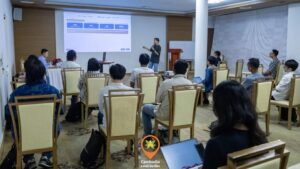A report has revealed that hundreds of locations on Google Maps have been manipulated by mainly Thai users, in what experts say is a tool to spread disinformation as users exploit its review system.
Cambodia’s online identity is under threat after hundreds of Google Maps locations were found to be manipulated by Thai users in what experts describe as a coordinated disinformation campaign.
The findings show how Google Maps’ reviewing system is being exploited by Thai Local Guide users to spread disinformation, harassment and offensive languages, damaging Cambodia’s image online, according to findings from the Google Maps Location Violations Investigation Report by Cambodia Local Guide Community.
‘Coordinated Disinformation Campaign’
“A coordinated campaign to spread disinformation” on Cambodia’s digital landscape was carried out by hundreds of Thai Google Local Guide accounts, with around seven out of 10 being new accounts. This implies that “recently created accounts are used in the campaign process”, according to Ngeth Moses, a reporter issuer, during the launch event on September 6 in Phnom Penh.
Google Local Guide accounts are categorised from level 1-10; new accounts are level 1-3 and mid-level accounts are between level 4-6. These users can suggest new places and make simple edits, the rest are classified as high level and expert accounts, which are trusted contributors with faster approval for changes.
“When we look into details of high-level local guide accounts, we found that they have history reviews in Thailand,” Moses added. “Some accounts, previously inactive, reactivated during the campaign period.”
The fact that Thai script (95 percent) was used and the majority of reviewers are “likely” from Thailand, as stated in the report, “implies that it is a coordinated campaign to spread disinformation”, said Moses.
Findings: Targeted Provinces and Harassment
Investigators analysed 717 reviews from 608 users, most of them posted in July and August 2025.
- Around 30 percent contained direct threats, political attacks or territorial disinformation.
- 97.8 percent were written in Thai script, despite targeting Cambodian locations.
- Only 40 percent of reported violations were removed by Google; the remaining 60 percent were still active as of September 5.
- Over 90 percent of active violations are labelled as harassment and offensive location names.
The provinces most affected are Koh Kong (113 cases, or nearly one-third of the total), Oddar Meanchey and Preah Vihear.


The location names in question were created with titles that target four high-ranking public figures in Cambodia, who were publicly involved in the Thai-Cambodia border conflict, according to the Harassment List seen by Kiripost.
Exploiting Google Maps’ Loophole
Moses described Google’s system as “broken”, failing to detect and prevent abuses such as offensive languages.
“Despite having policies to prevent putting offensive languages on the platform, Google Maps system allowed offensive phrases. This means that the system failed to detect offensive languages in the first place,” he said.
For example, a roundabout in Preah Sihanoukville was being edited as “a death roundabout” in Thai language.


According to Google Maps policy, Google Maps uses machine-learning algorithms to scan contributions for signals of suspicious user activity. The platform “does not allow content that misleads users, misrepresents information, or is intended to deceive or deface a place”.
“When unusual activity is detected, such as sure of problematic edits, Google may remove content, restrict contributions, or apply safeguards to sensitive locations,” the policy states, adding that “users who repeatedly violate our policies may face account suspension or permanent bans and, in some cases, contributions to certain places may be disabled”.
Kiripost contacted Google Press Team via email for comments, but did not receive a comment as of September 7, 2025.
Risks to Tourism and National Image
Despite Preah Vihear temple being locked so perpetrators cannot edit it, popular tourist places in Phnom Penh, such as the Royal Palace, Russian Market, Independence Monument and the National Museum, were among the targets with offensive languages in Thai, said Moses.
A place on Google Maps has multiple languages. Take the Independent Monument in Phnom Penh, for instance, the place name in English and Khmer appears correctly, yet when users switched to Thai language, the name in Thai appears to be “offensive”, Chy Sophat, a Local Guide expert, recalled of when the team analysed data.
Moses also raised concerns that the abuse could spread beyond the Thai language. “If similar violations occur in Chinese, it could seriously damage Cambodia’s tourism sector,” he noted.

What Can Be Done?
The Cambodia Local Guide Community urged Google to improve its monitoring systems and called on users not to respond with reviews when they find offensive edits.
“The correct action is to report location violations through the proper channels,” Moses said. “Leaving reviews only adds to the confusion and does not fix the problem.”
